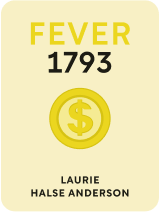

This article is an excerpt from the Shortform book guide to "Fever 1793" by Laurie Halse Anderson. Shortform has the world's best summaries and analyses of books you should be reading.
Like this article? Sign up for a free trial here .
Looking for Fever 1793 quotes from the book? How can these quotes help you understand the characters in the book better?
Fever 1793 is a historical fiction book about the yellow fever epidemic that happened in Philadelphia. The book is from the point of view of a teenage girl and gives you insight into what that fearsome time may have been like.
Continue below for five Fever 1793 quotes.
Fever 1793 Quotes
Fever 1793 details the yellow fever plague in Philadelphia a decade after the Revolutionary War through the eyes of young 14-year-old Matilda Cook. With great respect for historical accuracy and a keen voice, Laurie Halse Anderson describes the fear and decay that destroyed the nation’s capital and killed thousands of people in three months.
Here are five Fever 1793 quotes from the book with elaborations.
“Like most blacks in Philadelphia, Eliza was free. She said Philadelphia was the best city for freed slaves or freeborn Africans. The Quakers here didn’t hold with slavery and tried hard to convince others that slavery was against God’s will. Black people were treated different than white people, that was plain to see, but Eliza said nobody could tell her what to do or where to go, and no one would ever, ever beat her again.”
Matilda loved Eliza for more than her cooking abilities. Eliza was kind and often slipped a sugar cube in the bottom of her bowl of oatmeal. Eliza was born into slavery in Virginia. When she married, her husband used his savings to buy her freedom. Eliza had been saving up to buy his, but he was killed by a wild horse. Eliza stopped speaking and went into a deep mourning, something Lucille knew well. The two women became connected through their sorrow. After a few years, Eliza’s light finally turned back on inside, but Lucille’s never did.
“Had she ever enjoyed anything? Had every day been a struggle? Perhaps death would be a release, a rest for the weary.”
At night, Matilda sat vigil by her mother’s side. She looked into Lucille’s contorted face and wondered if her mother had ever been happy. Maybe death was a way she could be released from all the struggles she’d faced. Matilda grew emotional thinking of all the things her mother had tried to teach her that she always ignored. She prayed, read Psalms, and drifted to sleep.
“If the president was back, then the fever was truly over. If the president was back, we were safe.
I threw my arms around Nathaniel and planted a big kiss on his cheek.
He pulled back in surprise.
“Do you always do that when the president rides by? If so, I’ll take a job working for him.”
I blushed and looked down at my feet.”
Suddenly, Nathaniel rushed into the coffeehouse from outside. President Washington was back from Virginia and riding through town on the way to the capital. The patrons ran to the street and vied for a spot to watch the procession. Washington rode a white horse and waved to the onlookers. Matilda watched, thinking about how happy Grandpa would have been.
Once the president’s procession was gone, a caravan of carriages and wagons moved down the road. They were filled with people finally returning now that the president had returned. If Washington was back, the fever was really over.
“Have you considered what you might do to help? You have recovered, so you cannot get the fever again. You are young and strong. We have a real need for you.”
“How can I help anyone? I’m just a girl.” As soon as the words were out of my mouth, I wanted to pinch myself. The first time anyone treats me like a woman and I respond like an infant.”
Matilda sat in the back of the carriage next to an older woman named Mrs. Bowles. She was kind and worked at the orphanage. She asked Matilda what her plan was to help, but Matilda didn’t know what there was for her to do. She was just a girl after all. As soon as she said these words, Matilda regretted them. Someone was finally treating her as an adult, and she acted like a baby.
“I heard a man died of the fever in the middle of the street, and three black crows flew out of his mouth,” said Jeannine.
“Don’t be vile, Jeannine,” snapped her mother. “Those filthy refugees and creatures who live in the crowded hovels by the river, they’re always sick with something. But it is a gross injustice that my gala should suffer because the lower class falls ill. Don’t you agree, Lucille?”
Pernilla lamented about the fever, too. She complained that all of her society friends had fled to the country. She was bored and distraught that her gala to celebrate Colette’s recent engagement was canceled. What an injustice, she said. The filthy refugees and river rats were always sick with something. And now they were interfering in her social life. She looked to Lucille for agreement, but Lucille changed the subject.

———End of Preview———
Like what you just read? Read the rest of the world's best book summary and analysis of Laurie Halse Anderson's "Fever 1793" at Shortform .
Here's what you'll find in our full Fever 1793 summary :
- What the yellow fever epidemic in 1793 in Philadelphia looked like
- How this epidemic exposed the vulnerability of everyone, including the wealthy
- How an epidemic can impact a young person






